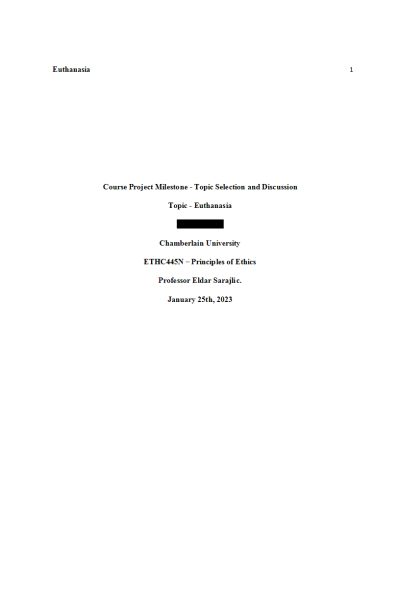ETHC 445N Week 3 Assignment; Course Project Milestone; Topic Selection and Discussion - Euthanasia
-
$20.00
| Institution | Chamberlain |
| Contributor | Sydonna Latea |
Content Preview
Euthanasia, defined by the (Oxford Languages Dictionary n.d) as the painless killing of a patient suffering from an incurable and painful disease or in an irreversible coma, has been a subject of heated debate from both a legal and ethical standpoint. It still remains illegal in most countries. There are four forms of euthanasia: active euthanasia which involves killing a patient by active means, e.g., injecting a patient with a lethal dose of a drug, passive euthanasia e.g., withholding life support, voluntary euthanasia where the patient consents to the action and involuntary euthanasia, done without the consent of the patient e.g., if the patient is unconscious and his or her wishes are unknown. (Center for Health Ethics. n.d)
Euthanasia is a subject so controversial that it does not give anyone the luxury of being neutral about it. Absolutely no gray areas. You either support it or you don’t. On one side of the debate, those for euthanasia argue that it is a violation of human freedom to force a continuation of life when people believe that their continued life is worse than death and restricting a person’s freedom when that restriction will result in an immense personal harm is unjustifiable. (Benatar2011). After all, we put animals, whose life is arguably valued as less than human life, out of their misery when they are sick. Why can we not then show the same compassion to suffering humans? The argument against euthanasia relies heavily on religious beliefs about the sanctity of life and the slippery slope reasoning of the potential for abuse that legalizing euthanasia poses, with fears that we will be euthanizing grandma at the first diagnosis of cancer……..Continue
| Instituition / Term | |
| Term | Uploaded 2023 |
| Institution | Chamberlain |
| Contributor | Sydonna Latea |
































